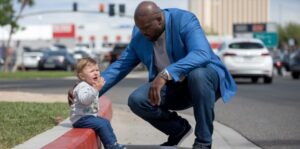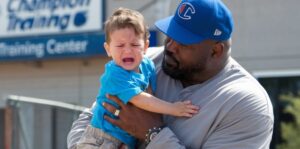Big Shaq’s Life-Changing Encounter: The Truth That Shattered His World
Shaquille O’Neal, the towering NBA legend whose presence commands attention wherever he goes, was cruising down the quiet stretches of Boulder Highway on what seemed like an ordinary Las Vegas afternoon, seeking solace from the relentless spotlight that had followed him throughout his legendary career. The desert landscape stretched endlessly before him, a stark contrast to the neon-lit chaos of the Strip, while his luxury vehicle glided smoothly over the asphalt that shimmered under the Nevada sun, creating an almost hypnotic rhythm that matched his contemplative mood.

Clad in his usual discreet attire—a simple t-shirt and casual shorts that did little to disguise his imposing 7-foot-1 frame—Shaquille presented a striking contradiction to the glitzy persona that cameras had captured for decades, revealing a more vulnerable side of the basketball icon who had dominated courts and entertainment venues across the globe. This particular drive was intended to serve as a therapeutic escape from the constant demands of celebrity life, a precious moment of anonymity where he could simply exist without the weight of expectations, endorsement deals, and public scrutiny that had become his constant companions since his rise to basketball stardom.
However, his solitary journey took an unexpected and heart-stopping turn when his keen eyes caught sight of something that would forever change his perspective on life, responsibility, and the fragility of human existence in the most profound way imaginable. There, positioned precariously near the shoulder of the busy highway, was a small figure that initially appeared to be a discarded doll or perhaps a pile of clothing, but as Shaquille’s vehicle drew closer, the horrifying reality became crystal clear—it was a toddler, no more than three years old, sitting alone and vulnerable in one of the most dangerous locations possible.
The massive athlete’s heart began racing with a intensity that rivaled his most challenging games as he immediately pulled over, his hands trembling slightly as he activated his hazard lights and quickly assessed the situation that had materialized before him like a nightmare scenario. The little child, dressed in nothing but a diaper and a torn t-shirt, looked up at the approaching giant with eyes that held a mixture of confusion, fear, and innocent trust that would haunt Shaquille for years to come, creating an indelible memory that would reshape his understanding of human vulnerability and the responsibilities that come with privilege and power.

As Shaquille carefully approached the toddler, speaking in the gentlest voice his deep baritone could manage, he noticed that the child appeared to be dehydrated, sunburned, and showing signs of exposure that suggested they had been abandoned for several hours under the merciless desert sun. The discovery sent waves of panic through his system as he realized that this was not a case of a momentarily lost child, but rather a deliberate abandonment that could have easily resulted in tragedy if he had not happened to be driving this particular route at this exact moment in time.
Using his cell phone to immediately contact emergency services, Shaquille provided his location while simultaneously attempting to comfort the frightened child, whose small hand instinctively reached out to grasp the basketball legend’s massive fingers with a grip that seemed to convey both desperation and hope. The 911 operator’s questions came rapidly as police and paramedics were dispatched to the scene, but what truly sent chills down Shaquille’s spine was the revelation that would soon emerge from the investigation—this was not an isolated incident, but part of a disturbing pattern of child abandonment that had been plaguing the Las Vegas area for months.
When the authorities arrived and began their preliminary investigation, they discovered that the toddler had been left with a hastily written note that contained information so shocking that even the experienced officers struggled to maintain their professional composure. The note revealed that the child’s parents had been involved in a drug trafficking operation that had gone terribly wrong, resulting in their arrest and subsequent imprisonment, leaving their innocent child as collateral damage in a world of criminal activity that had spiraled beyond their control.
The most devastating aspect of this discovery was the realization that the child had been deliberately placed on Boulder Highway because the perpetrators believed that the busy road would ensure the child would be found quickly, but they had catastrophically underestimated the dangers posed by traffic, desert wildlife, and the harsh environmental conditions that could have easily claimed the toddler’s life. This calculated cruelty combined with reckless endangerment created a perfect storm of circumstances that could have resulted in an unthinkable tragedy, had it not been for Shaquille’s timely intervention and his decision to take that particular route on that specific afternoon.
As paramedics examined the child and confirmed that despite dehydration and minor injuries, the toddler would make a full recovery, Shaquille found himself grappling with emotions that transcended anything he had experienced during his illustrious athletic career, realizing that this encounter had fundamentally altered his perspective on fame, fortune, and the random nature of human suffering. The investigation that followed would reveal a complex web of criminal activity, family dysfunction, and systemic failures that had culminated in this moment of crisis, forever linking the NBA legend to a story that would challenge his understanding of justice, compassion, and the responsibility that comes with being in a position to help those who cannot help themselves.
This life-changing encounter on Boulder Highway would ultimately inspire Shaquille to become more actively involved in child welfare initiatives, transforming a random act of discovery into a lifelong commitment to protecting vulnerable children and supporting families in crisis, proving that sometimes the most profound impacts come from the most unexpected moments of human connection.